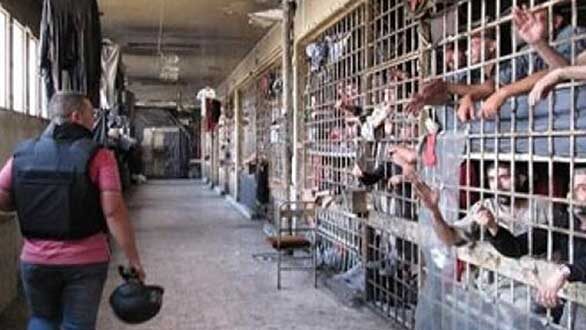In the rural areas of Daraa, numerous clandestine prisons are operated by local militias, Orient Net writes.
Militias aligned with the Assad regime in Daraa persist in committing widespread abuses against the local population. They arbitrarily arrest individuals, placing them in makeshift prisons where release is contingent upon the payment of a specified sum of money.
A relative of Abd al-Rahman, currently held by a local faction in Tafas on the western outskirts of Daraa, disclosed that he has been detained for nine months. The charges against him, relating to a shop robbery in the city, stem from the shop owner’s claim. Abdulrahman remains in custody with an unspecified release date and an imposed fine that his family cannot afford.
In a similar incident last May, a 25-year-old resident of the western countryside of Daraa, Hussein, was detained by local factions on charges of motorcycle theft. His release was contingent upon payment for the stolen bike and an additional 200,000 Syrian pounds to the jailer.
Due to its inability to assert effective control over the region, the Assad regime has replaced local militia leaders with individuals having personal ties to its security branches. Consequently, the regime turns a blind eye to the arbitrary detentions carried out by these commanders, most of whom are affiliated with the security branches.
Legal expert Assem al-Zoubi, in an interview with Orient Net, emphasized that these detentions lack due process, deviating from the norms outlined in the Syrian Penal Code. He asserted that labelling these detentions as imprisonment is inaccurate, as they are illegitimate and controlled by various factions or gangs.
Zoubi further highlighted the existence of illegal detention centers established by militias supporting Assad’s campaign against the Syrian populace even after the 2011 revolution. Notably, he clarified that there is no concrete evidence confirming the existence of secret detention centers in Daraa.
Private Prisons
In the rural areas of Daraa, numerous clandestine prisons are operated by local militias, some of which have affiliations with military security.
In Tafas, there are three such prisons, one located in the northern neighbourhood overseen by a person named al-Sa’idi (Maan al-Bardan). Sa’idi reports to Commander Abu Murshid al-Bardan, who is associated with Military Security. Another prison, situated at the Cement Corporation headquarters south of Tafas, is under the control of leader Khaled al-Tabiawi al-Zu’bi, a cousin of the late leader Khaldoun al-Zu’bi, who was ambushed and killed by Syrian security forces in August 2022. The third prison in the eastern neighbourhood is owned by Commander Habis Kiwan, affiliated with Air Force Intelligence. The lack of coordination among these prisons is attributed to factional and tribal differences, prompting each group to maintain its independent detention facility.
Residents in the area have provided testimonies indicating that many cases are resolved through reconciliation after the payment of monetary sums, proportional to the value of the claim. Additionally, both parties involved contribute a sum to the jailer to cover expenses he claims to have incurred during the prisoner’s confinement.
Beyond Tafas, prisons exist in Qusayr, Hait, and Sahm, which are administratively part of the Yarmouk Basin in the western countryside of Daraa. Qal’at Busra hosts a prison controlled by the Eighth Brigade of Military Security.
Despite being penalized on the European Union’s list for drug dealing, leader Imad Abu Zreik owns a prison in Naseeb east of Daraa. He conducts raids and arrests individuals involved in drug dealing activities.
 Eurasia Press & News
Eurasia Press & News




